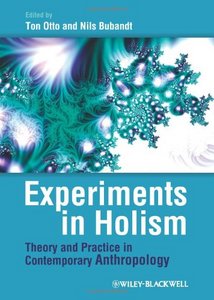Beyond the whole in ethnographic practice? Introduction to part 1
Otto, Ton, and Bubandt, Nils (2010) Beyond the whole in ethnographic practice? Introduction to part 1. In: Otto, Ton, and Bubandt, Nils, (eds.) Experiments in holism: theory and practice in contemporary anthropology. Wiley-Blackwell, West Sussex, UK, pp. 19-27.
![[img]](https://researchonline.jcu.edu.au/15824/4.hassmallThumbnailVersion/15824_Otto_%26_Bubandt_2010_Book_Cover.jpg)
|
Image (JPEG) (Book Cover)
- Cover Image
Download (44kB) |
|
|
PDF (Published Version)
- Published Version
Restricted to Repository staff only |
Abstract
Holism first truly became a hallmark of anthropological inquiry at the beginning of the twentieth century. At this time various conceptions of the whole informed the emerging theoretical traditions of modern anthropology: culture as a whole, symbolic structure as a whole, and society as a whole (sec Chapters 6,10, and 14, respectively). Interestingly, this embrace of holistic concepts - which also happened in a variety of other academic disciplines (see Chapter 1) - coincided in anthropology with a major methodological shift from broad ethnographic comparison to focused and intensive ethnographic fieldwork. Within two of the major traditions of anthropology - the American and British traditions - holism thus became closely associated with ethnographic fieldwork as a way of understanding a whole way of life. This link was, as Stocking has observed, to a large extent "mythopoetic" (1983). It established a heroic image of fieldwork, pretending it was new when in fact it was not, and creating a utopian ideal about the independent and neutral fieldworker who was able to capture "the whole" through a form of participant observation that leaned heavily toward natural science ideas of truth, comprehensiveness, and objectivity. This "mythopoetic" link was strongest amongst British and American anthropologists, epitomized by Bronislaw Malinowski and Franz Boas, respectively. French anthropology was different in this regard, since it was characterized by a much more ambivalent relationship to fieldwork. Claude Levi-Strauss, the founder of French structuralism, famously declared that he "hated travelling" (Levi-Strauss 1992), and while other French anthropologists - like Marcel Griaule and Michel Leiris - spearheaded a tradition for fieldwork (Stocking 1983; Clifford 1988), this aspect of the French tradition never entered, as Archetti has pointed out, the annals of "international anthropology"(2006). As a result, fieldwork and holism were never mythopoetically linked in French anthropology, neither in its self-image nor in its outside disciplinary reception, to the extent that they increasingly were within British social anthropology and American cultural anthropology. The French contribution to anthropological holism (deservedly or not) therefore came to be associated with a particular theoretical heritage rather than with ethnographic fieldwork (see Chapter 10). The implicit link between holism and fieldwork within two of the dominant traditions of anthropology was probably one of the main reasons why holism became firmly established as an anthropological doxa. Holism was not only clearly implied in the discipline's central theoretical perspectives and models, but also deeply grounded in the new practice of doing and writing ethnography, typically leading to its classical products: the monograph and the ethnographic film. It is with regard to this modality of its existence - embedded in the practices and standards of ethnographic research and representation - that holism came to the center of critical attention in the 1980s as part of the postmodern critique of anthropological representation.
| Item ID: | 15824 |
|---|---|
| Item Type: | Book Chapter (Research - B1) |
| ISBN: | 978-1-4443-3323-7 |
| Date Deposited: | 19 Apr 2011 06:26 |
| FoR Codes: | 16 STUDIES IN HUMAN SOCIETY > 1601 Anthropology > 160104 Social and Cultural Anthropology @ 100% |
| SEO Codes: | 97 EXPANDING KNOWLEDGE > 970116 Expanding Knowledge through Studies of Human Society @ 100% |
| Downloads: |
Total: 56 Last 12 Months: 1 |
| More Statistics |



